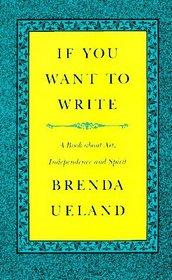Helpful Score: 1
Inspiring. Totally inspiring.
Shirley J. (NoShushing) -
Helpful Score: 1
This is considered a classic in the field. It was first written in 1938 and reissued in 1987. Carl Sandburg called it "the best book ever written about how to write." She stresses writing with simplicity and clarity--being yourself on paper. It should be required reading for government writers and graduate students.
Wendy S. reviewed If You Want to Write: A Book about Art, Independence and Spirit on + 10 more book reviews
a classic in learning to write!
Angela B. (angburke) reviewed If You Want to Write: A Book about Art, Independence and Spirit on + 40 more book reviews
Decent, but not my favorite book on writing (that would be "Writing Down the Bones" by Natalie Goldberg).
Andrea B. (AndreaB) reviewed If You Want to Write: A Book about Art, Independence and Spirit on + 42 more book reviews
As much a book about living as about writing; it seeks to help people find their creative center. Carl Sandburg calls it "the best book ever written about how to write". Thoroughly enjoyable.
Kayote B. (kayote) reviewed If You Want to Write: A Book about Art, Independence and Spirit on + 254 more book reviews
On first starting this book, it seems to ramble. Wander, ramble, not be well focused. Even by the end, I would not hold this up as an example of excellent word craft/choice or sentence design.
On the other hand, it WORKS. I realized at some point that I had been pulled in, that she was speaking to ME and I was hearing. It has yet to be seen if I can put her ideas into practice, but they rang very true. The words just rang true, so the book seemed perfectly written. Stepping back and looking at pieces it didn't, but taking it as a whole, it just is.
Her main push is you have to be true when writing. Write what you felt, and this will infect the reader with the same feeling. In fiction SEE the characters--and editing just means seeing them clearly. If you can see them, then describe what they are doing, it will work. In non-fiction (which seemed to be more what she was talking about, though she did quote someone who said a lie in fiction is more glaring than in non-fiction) you need to write what you feel. Often the first inclination is the best. When editing, if you have written from within, it will be very obvious which sentences aren't and you can then fix those.
I also liked her idea for editing a story--if you don't think a story works, set it aside. Write two more. Then go back and read the first. It will be clear what didn't work and needs fixing!
Excellent quotes through the book as well. Sometimes I felt it was proof-by-famous-person (as we used to describe in grad school), but she well contained them within the writing and seemed so excited by them it was hard not to be. Not all of them spoke to me, but usually the thrill she had had when finding a discussion that clarified something for her was infectious.
Everyone is talented, original, and has something important to say. Everyone needs to exercise imagination/creativity and a great way to do that is writing. So sit down, and write for yourself, true, and worry not about anything but writing what you feel and see, be it seen outside or in your mind.
On the other hand, it WORKS. I realized at some point that I had been pulled in, that she was speaking to ME and I was hearing. It has yet to be seen if I can put her ideas into practice, but they rang very true. The words just rang true, so the book seemed perfectly written. Stepping back and looking at pieces it didn't, but taking it as a whole, it just is.
Her main push is you have to be true when writing. Write what you felt, and this will infect the reader with the same feeling. In fiction SEE the characters--and editing just means seeing them clearly. If you can see them, then describe what they are doing, it will work. In non-fiction (which seemed to be more what she was talking about, though she did quote someone who said a lie in fiction is more glaring than in non-fiction) you need to write what you feel. Often the first inclination is the best. When editing, if you have written from within, it will be very obvious which sentences aren't and you can then fix those.
I also liked her idea for editing a story--if you don't think a story works, set it aside. Write two more. Then go back and read the first. It will be clear what didn't work and needs fixing!
Excellent quotes through the book as well. Sometimes I felt it was proof-by-famous-person (as we used to describe in grad school), but she well contained them within the writing and seemed so excited by them it was hard not to be. Not all of them spoke to me, but usually the thrill she had had when finding a discussion that clarified something for her was infectious.
Everyone is talented, original, and has something important to say. Everyone needs to exercise imagination/creativity and a great way to do that is writing. So sit down, and write for yourself, true, and worry not about anything but writing what you feel and see, be it seen outside or in your mind.




